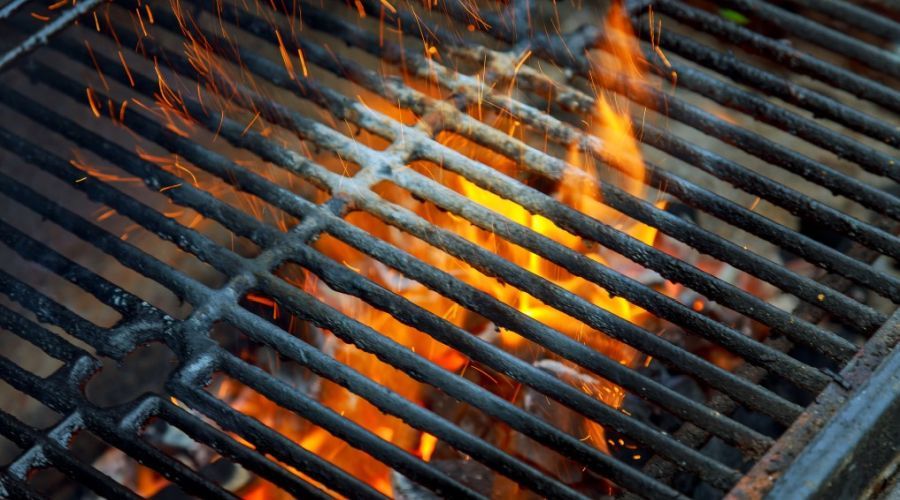Cast Iron vs Porcelain Grill Grates: Which is Best for BBQ?
Written By James Morgan
For barbecue enthusiasts, the choice between cast iron vs porcelain grill grates can significantly impact the grilling experience. Both materials have their ardent supporters, and each type of grate offers its unique advantages and drawbacks. Whether you're cooking up a storm for a family gathering or simply enjoying a quiet meal, understanding the nuances of these grill grates can elevate your barbecue game.
Choosing the right grill grate is essential for achieving the perfect sear, flavor, and texture. While both materials can perform admirably, the decision often boils down to personal preference and grilling style. Let's delve into the specifics of each type to help you make an informed decision.

Understanding Cast Iron Grill Grates
Cast iron grill grates are renowned for their ability to retain heat. This characteristic makes them ideal for achieving those beautiful, restaurant-quality sear marks on your grilled foods. Cast iron grates are durable and can withstand high temperatures, which is essential for serious grillers.
However, they do require a bit more maintenance. Regular seasoning is necessary to prevent rust and maintain their non-stick surface. If you're committed to the care, cast iron grates can last a lifetime. For those who enjoy the ritual of grilling and are willing to put in the effort, cast iron is often the preferred choice.
Exploring Porcelain Grill Grates
Porcelain grill grates, on the other hand, are typically easier to maintain. They are made by coating cast iron or steel with a layer of porcelain enamel. This coating helps prevent rust and makes cleaning simpler, as food is less likely to stick.
While porcelain grates offer convenience, they are not without their drawbacks. The porcelain coating is susceptible to chipping, especially if you're using metal utensils. Once chipped, the exposed metal can rust, which compromises the grate's longevity. Therefore, it's essential to handle porcelain grates with care.
Performance: Heat Retention and Distribution
In terms of heat retention and distribution, cast iron grates generally outperform porcelain. Their ability to hold high temperatures makes them ideal for searing meats. If you're looking to achieve that perfect steak sear, cast iron is the way to go.
Porcelain grates, while not as robust in heat retention, distribute heat more evenly. This can be advantageous for cooking foods that require a consistent temperature throughout, such as chicken or fish. For a deeper dive into grilling techniques, check out this comparison between grill grates and griddles.
Maintenance and Longevity
Maintenance plays a crucial role in the longevity of both cast iron and porcelain grill grates. As mentioned, cast iron requires regular seasoning to maintain its integrity and prevent rust. In contrast, porcelain grates need to be handled gently to avoid damaging the enamel coating. For tips on maintaining your grill grates, you might find this guide on cleaning grill grates helpful.
Ultimately, both types of grates can last many years if properly cared for. The choice depends on how much maintenance you're willing to commit to and the kind of grilling experience you desire.
Cost Considerations
Cost is another factor to consider when choosing between these grill grates. Generally, porcelain grates tend to be more affordable upfront. However, the potential need for replacement due to chipping could make them more expensive in the long run.
Cast iron grates are often priced higher initially but can be a worthwhile investment due to their durability. If you're serious about grilling and willing to invest in a high-quality grate, cast iron is a compelling option.
Making the Right Choice for Your Grill
Deciding between cast iron vs porcelain grill grates ultimately depends on your grilling priorities. If you value heat retention and are up for the maintenance, cast iron could be your best bet. For those who prioritize ease of use and cleanup, porcelain grates might be more suitable.
Consider your cooking habits, the types of food you grill most often, and how much time you're willing to spend on maintenance. For a broader perspective on grill grates, you may want to explore this article on grill grate options.

Frequently Asked Questions
Are cast iron grill grates better than porcelain?
It depends on what you prioritize. Cast iron grates excel in heat retention and searing, while porcelain grates offer ease of maintenance and even heat distribution.
How do you maintain cast iron grill grates?
Regular seasoning with oil and thorough cleaning after each use are key to maintaining cast iron grill grates. Avoid using soap, as it can strip away the seasoning.
Can porcelain grill grates chip easily?
Porcelain grill grates can chip if not handled with care. Use non-metal utensils and avoid dropping the grates to preserve the porcelain coating.



